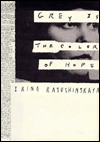

 |

|

The average rating for Grey is the color of hope based on 2 reviews is 4 stars.
Review # 1 was written on 2008-07-08 00:00:00 Marco Eckel Marco EckelThe relationship between the Russian language and the English language is one of the most compelling proofs that the universe has a sense of humor (and horror). That, democracy, and snuggies. Grey is the Color of Hope is tragic and compelling enough as a story that saying I didn't like it would be like saying I hate babies or ice cream or what have you. Really, how can you find fault with a prison-camp memoir? "Well, if I was in a prison camp, I would have written something with more sex appeal"? Honestly, though, the translation was so god-awful that it really was slightly painful to read. My Russian is uzhasno anymore, but I wondered part way through if I wouldn't do better with a dictionary and the original language text. Unfortunately, I couldn't find the Russian version anywhere (due to a Soviet plot, I'm sure. . . No not really. . . Well, maybe). Aside from the already daunting challenge of translating everyday Russian into readable English, prison slang was a big part of communicating the feel of Irina Ratushinskaya's experience in Soviet “reeducation” camps. Alyona Kojevnikov, who translated the version of Grey is the Color of Hope that I read (which is actually the only version that exists, as far as I know) did not do a stellar job at this. For example, early on Ratushinskaya relates a few of the common prison terms, one of which was translated as "warmer". Ratushinskaya defines this as “the acquisition of something not officially permitted, such as [the:] exchange of sweets for cigarettes. The first, obvious interpretation strikes me immediately – something to warm the heart” (p. 11). I can get past the use of the word “sweets” by thinking of it as just a word I would never use (unless, of course, I was disguised as an evil witch and trying to lure some unsuspecting kids into my gingerbread house – and even then I would probably say “sweeties”), and by accepting that maybe in some other English-speaking city someone else might use it. The translation of “warmer”, though, was disappointing. I could only imagine that this was one of those charming Russian words that end in nik, like tyeplovnik or something else that sounds really fun. “Warmer” doesn't really convey the sense of usefulness that a word ending in nik has, and also it’s stupid. No badass American prisoner would use the word “warmer”. I admit that it would take some poetic license to come up with a better word that conveys that meaning in English, but come on, Alyona Kojevnikov! Can you stop taking everything so literally, or do I need to call Seamus Heaney in to replace you? (Always time for a Beowulf joke, right?) That brings up the other point that Ratushinskaya is a poet, and I’m willing to believe that her poetry is touching or beautiful, though the translation did nothing to reveal that. Clearly, the problem is that English is Ms. Kojevnikov’s second language, and translating from a native language to a second language awkward. So much connotation isn’t obvious. Still . . . at one point she translated what I assume was the Russian word “Klass!”, which means “Cool” in English, to “Class!”, which doesn’t mean anything, unless you are in a school. No excuse. Other than the translation problem, this is just a pretty outrageous story. Ratushinskaya was pulled from her home by the KGB for writing poetry and generally supporting human rights, and then she basically established a new life with the other political prisoners in her camp. She gives detailed descriptions of detention and torture practices in the Soviet prisons, and I, of course, have respect for memoirs of this nature. In many ways, I believe, she wrote this as a letter to the West, to reveal the inhumanity of the Soviet government, and I would say that she is successful in what she was trying to accomplish. I wouldn’t necessarily recommend this book, and it is definitely not a light weekend read, but I’m not sad that I read it either. I would still like to own a copy in the original Russian. |
Review # 2 was written on 2011-07-23 00:00:00 Allan Eriksson Allan ErikssonThis is one of the few school assigned books I've felt a desire to read again and again. Partly responsible for the inspiration behind my painting, Grey. |
CAN'T FIND WHAT YOU'RE LOOKING FOR? CLICK HERE!!!